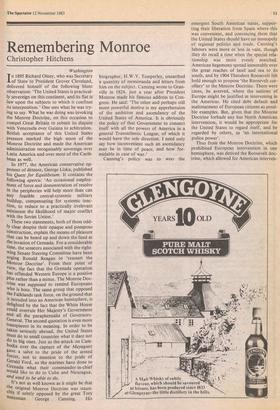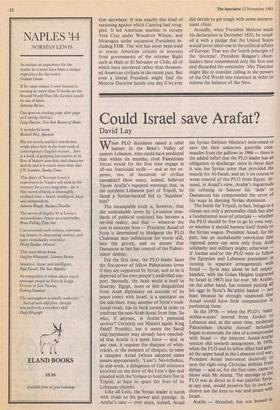Remembering Monroe
Christopher Hitchens Washington In 1895 Richard Olney, who was Secretary of State to President Grover Cleveland, delivered himself of the following blunt observation: 'The United States is practical- ly sovereign on this continent, and its fiat is law upon the subjects to which it confines its interposition.' One sees what he was try- ing to say. What he was doing was invoking the Monroe Doctrine, on this occasion to compel Great Britain to submit its dispute With Venezuela over Guiana to arbitration. British acceptance of this United States pressure marked the high noon of the Monroe Doctrine and made the American administration recognisably sovereign over Latin America and over most of the Carib- bean as well.
In 1977, the American conservative op- ponent of detente, George Liska, published his Quest for Equilibrium. It contains the following apercu: 'An occasional employ- ment of force and demonstration of resolve in the peripheries will help more than can any feasible central-systemic military buildup, compensating for systemic inac- tion, to reduce to a practically irrelevant Minimum the likelihood of major conflict with the Soviet Union.'
These two statements, both of them odd-
• IY clear despite their opaque and pompous construction, explain the moans of pleasure that can be heard up and down the land at the invasion of Grenada. For a considerable time, the senators associated with the right- wing Senate Steering Committee have been urging Ronald Reagan to 'reassert the Monroe Doctrine', From their point of view, the fact that the Grenada operation has offended Western Europe is a positive Plus rather than a minus. The Monroe Doc- trine was supposed to remind Europeans who is boss. The same group that opposed the Falklands task force, on the ground that It intruded into an American hemisphere, is delighted by the fact that the White House Could overrule Her Majesty's Government and all the paraphernalia of Governors- General. The second quotation is even more transparent in its meaning. In order to be taken seriously abroad, the United States Must do to small countries what it dare not do to big ones. Just as the attack on Cam- bodia over the capture of the Mayaguez gave a salve to the pride of the armed forces, not to mention to the pride of Gerald Ford, so the marines have done to Grenada what their commander-in-chief would like to do to Cuba and Nicaragua, ond used to be able to do.
It s not as well known as it might be that he original Monroe Doctrine was staun- chly if subtly opposed by the great Tory statesman George Canning. His biographer, H.W.V. Temperley, unearthed a quantity of memoranda and letters from him on the subject. Canning wrote to Gran- ville in 1824, just a year after President Monroe made his famous address to Con- gress. He said: 'The other and perhaps still more powerful motive is my apprehension of the ambition and ascendancy of the United States of America. It is obviously the policy of that Government to connect itself with all the powers of America in a general Transatlantic League, of which it would have the sole direction. I need only say how inconvenient such an ascendancy may be in time of peace, and how for- midable in case of war.'
Canning's policy was to woo the emergent South American states, suppor- ting their liberation from Spain where this was convenient, and convincing them that the United States should have no monopoly of regional politics and trade. Canning's labours were more or less in vain, though they do recall a time when the special rela- tionship was more evenly matched. American hegemony spread inexorably over the great reaches of land and sea to its south, and by 1904 Theodore Roosevelt felt bold enough to propose 'the Roosevelt cor- ollary' to the Monroe Doctrine. There were cases, he averred, where the nations of Europe might be justified in intervening in the Americas. He cited debt default and maltreatment of European citizens as possi- ble examples. But, given that the Monroe Doctrine forbade any but North American intervention, it would be appropriate for the United States to regard itself, and be regarded by others, as 'an international police power'.
Thus from the Monroe Doctrine, which prohibited European intervention in one hemisphere, was derived the Roosevelt doc- trine, which allowed for American interven- tion anywhere. It was exactly this kind of reasoning against which Canning had strug- gled. It led American marines to occupy Vera Cruz under Woodrow Wilson, and Nicaragua under successive Presidents in- cluding FDR. The writ has never been used to rescue American citizens or interests from governments of the extreme Right such as Haiti or El Salvador or Chile, all of which have murdered rather than threaten- ed American civilians in the recent past. But even a liberal President might find the Monroe Doctrine handy one day if he ever
did decide to get tough with some inconve- nient client.
Actually, when President Monroe made his declaration in December 1823, he coupl- ed it with a pledge that the United States would never intervene in the political affairs of Europe. That was the fourth principle of the 'doctrine'. President Reagan's cheer- leaders have remembered only the first one and discarded the remainder. Mrs Thatcher might like to consider calling in the powers of the Old World into existence in order to redress the balance of the New.















































 Previous page
Previous page